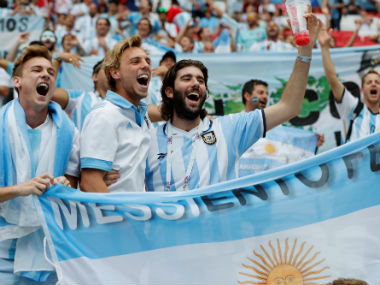Moscow: It gets to you. Long hours in the press centre mean that every pang of hunger is satiated by pasta, burger, pizza, or a hot dog. A quarter so bereft of imagination that you would rather watch Japanese players pass the ball amongst themselves for 10 minutes when they should really be trying to score a goal instead (which is how the clash against Poland drew to a close). [caption id=“attachment_4664941” align=“alignleft” width=“380”] Argentina fans in the stadium before the match against France. Reuters[/caption] One feels bluer when the dreary gastronomic offerings by the media centre are followed by inebriated fans who are having a laugh while you tap away on your keyboard, rushing to meet the next deadline. As journalists have found at this World Cup, it can get worse. Count your blessings if you have escaped dry while supporters throw cups of beer to celebrate the victory. The latest attack was reported in the Luzhniki Stadium when Russia won a dramatic penalty shootout against Spain. Before and after the final kick, the atmosphere dripped with tension. Occasionally, though, the work does get over. As I visited Kazan for the humdinger that was France-Argentina in the Round of 16, there appeared windows of opportunity to sample Tatar cuisine. For a couple of days at least, I could get away from the drudgery of sinking my teeth into powdery, cold bread. From Qistibi (roasted, stuffed flatbread) to Azu (meat with stew), not to forget Chakchak (deep fried balls in honey), the range of Tatar’s gastronomy provided warm comforts. There was also the opportunity to seek out an Indian restaurant in Kazan with a fellow journalist; the boundaries of our patience with the food in the media centre were clearly on the verge of breaking point. Named Malabar, the restaurant seemed to be run by chefs who were keen to turn every item of the menu into dessert. It is one thing to prepare the food with mild flavours; quite another to deliberately sweeten the taste. Just to grant peace to the mind of the chef, sweet nothings were delivered from our side before we left the establishment. Sadly, there was not much time left to sample the other delights of Kazan. I once again had to seek relief in the oddly sprayed ketchup over a hot dog. The departure from Kazan also brought an end to the resounding entertainment presented by Argentinean fans at this World Cup. On the warm Saturday afternoon when Argentina played France, the World Cup arrived at the pleasures of knockout football while Kazan Arena was the latest venue to be colonised by the Albiceleste supporters. The blue and white colours bounced everywhere as the national anthem played out—only the 66 second-long instrumental version, of course—and the fans hummed it strong enough to make you believe there were words in the song that one might have overlooked. Such was the exuberance of the Argentina supporters that they dominated the opposition across venues in Russia even as their favourite players floundered on the pitch. But after the Albiceleste’s defeat to France, the sounds of the World Cup dimmed and its fans’ musical gifts were sorely missed. It is not just that they sang really well, but also excelled in the ways they performed and orchestrated the songs. With Mexico gone as well, the World Cup’s musicality has been dented somewhat but the home fans are keeping their end of the bargain. Following Russia’s shock win over Spain, locals came out in numbers seldom seen before. After weeks of racing through the streets of Moscow, we discovered that traffic jams populated by the minute. Chants of “Russia, Russia” rang in the air, its banal words overshadowed by the riotous joy which took hold of the locals. There was a sense that the Russians were making the most of the opportunity because there would not be another chance. But such are the surprises in this World Cup that the party for the hosts might continue. But some will not be there when the last songs are sung and the final drinks are had. With more teams out of the competition now than in, many journalists are left contemplating the flight back home. They wish to stay till the final, but their fortunes depend on their respective countries’ performance. Their investment in the prospects of their national side is not merely professional; there are personal consequences as well. In the aftermath of Spain’s exit from the World Cup, the sad, long faces of Spanish journalists told their own story. I am sure this does not provide any consolation to them but, at least, they will not be sprayed with beer anytime soon.
The best bits and bobs from the sidelines of the FIFA World Cup 2018 in Russia, this time from the city of Kazan
Advertisement
End of Article


)

)
)
)
)
)
)
)
)



